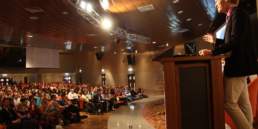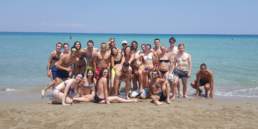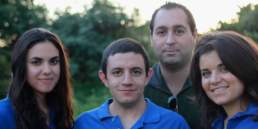How European do people feel in Las Palmas, Porto, Helsinki or Sankt Peterburg? How do the AEGEE antennae in these cities cope with the fact that they living on the edge of Europe? The Golden Times asked eight antennae what the biggest problems are for them which are resulting from the geographical position – and whether there are also benefits. In the second part of the series “Living on the edge of Europe”, Elmar Guliyev, PR and FR responsible of AEGEE-Bakı, reports from the East of Caucasus.

Golden Times: Let’s start with the basics: how many members do you have? And when was your antenna founded?
Elmar Guliyev: AEGEE- Bakı has been operating since 2004. To date, nearly 7000 young people have been involved in our projects. Now we have about 100 members and 50 of them are more active.
Golden Times: How European-minded are normal people and students in your city?
Elmar: Ultimate goal of AEGEE-Bakı is to provide integration of our young people to Europe.

Golden Times: Is it hard to find members?
Elmar: Yes, we have a few problems in this regard. There are a lot of NGOs in our city, which creates some problems for us. AEGEE is one of the international organisations. Young people in Bakı who want to attend international events, integrate in Europe and make a lot of friends from different European countries always prefer international organisations. Since this makes it more difficult for us, we think AEGEE-Bakı has enough members.
Golden Times: What do you tell potential members when they say: “AEGEE sounds nice, but all the events are far away…”
Elmar: Yes, it is right that AEGEE-Bakı is one of the farthest local. Price of tickets for events which take place in Europe are so expensive for us – and also for European young people who want to come here. But we always help our members to find the cheapest flight. We made the slogan: “If Europe is far away then we need to carry it here”. That is why we are trying to organise more international projects ourselves.
 Golden Times: How much does travelling cost to Central European locations, such as Munich or Vienna?
Golden Times: How much does travelling cost to Central European locations, such as Munich or Vienna?
Elmar: The price of a ticket to Central or Western Europe is approximately 400 to 450 euro plus the costs of the Schengen visa, which is 60 Euro. It is really very expensive in comparison to the prices of travelling within Central Europe.
Golden Times: Is getting visa for events a big problem for your members?
Elmar: It is not a big problem. We always help our members to get visa.
 Golden Times: Are there also positive aspects from your geographical location?
Golden Times: Are there also positive aspects from your geographical location?
Elmar: Yes, We have an opportunity to present our region to those who have little information about this part of Europe. It also helps us being a main point of Europe in future.
Golden Times: Roughly how many foreign members are attending your events year year?
Elmar: Approximately 80 to 90 foreign participants attend our events per year.
Golden Times: Do you cooperate in 2012 with other antennae or do you plan that for 2013?
Elmar: We are planning to organise a youth exchange with AEGEE-Tbilisi in 2013.
 Golden Times: Which international events are you planning for 2013?
Golden Times: Which international events are you planning for 2013?
Elmar: We will organise a Conflict Resolution Meeting in February, the International Novrooz Festival in Azerbaijan in March, the previously mentioned Cultural Youth Exchange in cooperation with AEGEE-Tbilisi and a Summer University in June-July.
Golden Times: Do you sometimes wish your antenna was more central or do you enjoy being at the edge of Europe?
Elmar: Of course we would like to be more in the centre of Europe, especially for the purpose of being able to participate in more AEGEE events.
Related Posts
1st August 2019
The Gallery of All Presidents of AEGEE-Europe
Here is the gallery of all Presidents of AEGEE-Europe - with photos of every one of them. Enjoy the list!



